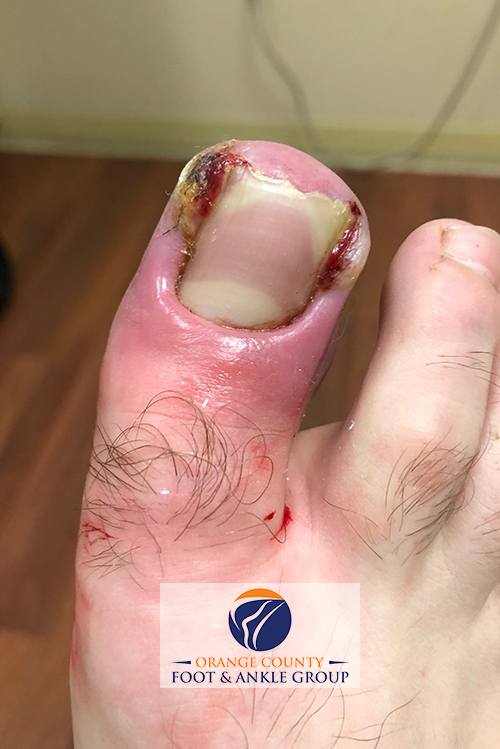Say goodbye to ingrown toenails: A guide to podiatry treatments
Body
The debilitating pain of ingrown toenails is common among millions of individuals. It is described as a painful condition caused by the edge of the toenail growing into the surrounding skin. Pain and inflammation are the common consequences of an ingrown toenail, whereas if left untreated the condition may get worse and lead to severe toenail infection and permanent damage to the nail matrix.
Timely diagnosis and treatment of ingrown toenails are very important. In mild cases, the toenail can heal on its own within a few days, whereas there is also a possibility that the symptoms may get worse and damage the nail matrix. Hence, it is crucial to consult a foot doctor and get the toenail evaluated professionally.
Bathroom surgeries are fatal and highly prohibited. If an individual is experiencing pain, inflammation and redness or swelling around the edge of the toenail, going toan experienced podiatrist in Tustin CA is essential. Today’s article highlights the podiatry treatment provided for ingrown toenails and the importance of seeking medical care even for mild cases of ingrown toenails.

What is podiatry and how does a podiatrist treat an ingrown toenail?
Podiatry is a branch of medical specialty focused on the diagnosis and treatment of ailments in the lower extremities. A podiatrist is a trained and licensed medical professional who helps patients to treat as well as prevent debilitating conditions that affect the feet, ankles and lower limbs. A variety of treatment modalities are used by a foot doctor to offer the best treatment for foot and ankle related conditions. Podiatristsprovide their services to patients from all age groups. Moreover, athletes seek routine care from podiatrists to get the best in class sports injuries treatment.
Podiatrists are also specialist doctors for toenails and skin conditions, therefore they play a crucial role in the prevention, diagnosis and treatment of ingrown toenails.
The first-line treatment for ingrown toenails
A podiatrist can guide you throughout the process of conservative management of the symptoms of ingrown toenails. The first line of treatment involves soaking the affected feet in a combination of warm water and Epsom salt.
For severe conditions of inflammation or risks of infection, a podiatrist may also recommend topical or oral antibioticmedications. A team of researchers conducted a randomized trial on the efficacy of conservative management of ingrown toenails and identified that the condition fully resolved for around 70% of patients who received timely medical care.
Invasive treatments for ingrown toenails
Conservative management is helpful for mild cases of ingrown toenails. However, if the treatment is delayed and the symptoms become worse, then invasive treatments become essential.
Podiatrists also specialize in various types of foot surgery and can perform nail avulsion to treat the condition of ingrown toenails.
Nail avulsion is a surgical procedure to remove the affected portion of the nail. The success rate of surgical intervention for an ingrown toenail is 88% to 100% according to a systematic review conducted in 2013. The surgery is performed under local anesthesia and is considered a useful technique for patients who are suffering from recurring ingrown toenails.
Total nail avulsion is recommended for severe conditions, whereas partial nail avulsion is another technique that is considered the most effective. For faster regrowth and for prevention of recurring toenail infections, podiatrists may remove the affected part of the nail and the underlying nail bed.
These surgical procedures can be performed within an hour and done on an outpatient basis. However, it is recommended to wear open toed shoes for several days for faster recovery. The recovery process is smooth and quick for ingrown toenail surgeries because the pain and discomfort subside within a week. The length of the recovery period depends on the healing abilities of the individual, however, post-operative care is simple and positive outcomes can be obtained easily.
Preventive measures for ingrown toenails
Along with the diagnosis and treatment of Toenail Fungus Laser, a podiatrist can also guide to prevent recurring episodes of ingrown toenails.
Tight and restrictive footwear invite a variety of foot conditions and ingrown toenails are one of them. Routine visits to a podiatry clinic are useful to get expert guidance on the right type of footwear. Moreover, trimming the toenails too short can also contribute to the problem. A podiatrist can educate patients on the appropriate method of trimming the toenails and maintaining foot hygiene.
Conclusion
In some cases, ingrown toenails get better on their own. However, delaying the treatment can worsen the symptoms and an individual has to experience a painful and debilitating foot condition. Therefore, timely consultation with a podiatrist is beneficial. There are various types of podiatry treatments available which have clinical evidence of efficacy in reducing symptoms and preventing recurrence. Get a complete guide on preventive measures or seek prompt medical attention for your condition at Orange County Foot and Ankle Group.
It is a top-rated podiatry service in California offering best-in-class treatment for ingrown toenails. With three offices in Orange County, the highly experienced podiatrists at OCFA are renowned for their vast knowledge of medical and surgical care of foot and ankle conditions. Contact OCFA and make a same day appointment to receive expert treatment for ingrown toenails.









Comments